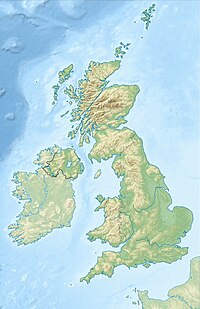
Back Portsmouth Afrikaans Portsmouth AN بورتسموث Arabic بورتسموث ARZ Portsmouth AST Portsmut Azerbaijani پورتسموث AZB Портсмут Byelorussian Портсмут (горад) BE-X-OLD Портсмът Bulgarian
Portsmouth (/ˈpɔːrtsməθ/ ⓘ PORTS-məth) is a port city and unitary authority in Hampshire, England. Most of Portsmouth is located on Portsea Island, off the south coast of England in the Solent. This means Portsmouth is the only English city not located primarily on the mainland. Located 74 miles (119 km) south-west of London, 50 miles (80 km) west of Brighton and Hove, and 22 miles (35 km) south-east of Southampton; Portsmouth is part of the South Hampshire conurbation. It is the most densely populated city in the United Kingdom, with a population last recorded at 208,100.[5]
Portsmouth's history can be traced to Roman times and has been a significant Royal Navy dockyard and base for centuries. Portsmouth was founded c. 1180 by Anglo-Norman merchant Jean de Gisors in the south-west area of Portsea Island, a location now known as Old Portsmouth.[6] Around this time, de Gisors ordered the construction of a chapel dedicated to St Thomas Becket.[7] This became a parish church by the 14th century. Portsmouth was established as a town with a royal charter on 2 May 1194.[8][9] The city is home to the first drydock ever built. It was constructed by Henry VII in 1496.[10]
Portsmouth has the world's oldest dry dock, "The Great Stone Dock"; originally built in 1698, rebuilt in 1769 and presently known as "No.5 Dock".[11] The world's first mass production line was established at the naval base's Block Mills which produced pulley blocks for the Royal Navy fleet. By the early-19th century, Portsmouth was the most heavily fortified city in the world, and was considered "the world's greatest naval port" at the height of the British Empire throughout Pax Britannica. By 1859, a ring of defensive land and sea forts, known as the Palmerston Forts had been built around Portsmouth in anticipation of an invasion from continental Europe.
In the 20th century, Portsmouth achieved city status on 21 April 1926.[12] During the Second World War, the city was a pivotal embarkation point for the D-Day landings and was bombed extensively in the Portsmouth Blitz, which resulted in the deaths of 930 people. In 1982, a large Royal Navy task force departed from Portsmouth for the Falklands War. Her Majesty's Yacht Britannia was formerly based in Portsmouth and oversaw the transfer of Hong Kong in 1997, after which Britannia was retired from royal service, decommissioned and relocated to Leith as a museum ship.
HMNB Portsmouth is an operational Royal Navy base and is home to two-thirds of the UK's surface fleet. The base has long been nicknamed Pompey, a nickname it shares with the wider city of Portsmouth and Portsmouth Football Club. The naval base also contains the National Museum of the Royal Navy and Portsmouth Historic Dockyard; which has a collection of historic warships, including the Mary Rose, Lord Nelson's flagship, HMS Victory (the world's oldest naval ship still in commission), and HMS Warrior, the Royal Navy's first ironclad warship.
The former HMS Vernon shore establishment has been redeveloped into a large retail outlet destination known as Gunwharf Quays which opened in 2001.[13] Portsmouth is among the few British cities with two cathedrals: the Anglican Cathedral of St Thomas and the Roman Catholic Cathedral of St John the Evangelist. The waterfront and Portsmouth Harbour are dominated by the Spinnaker Tower, one of the United Kingdom's tallest structures at 560 feet (170 m).
Southsea is Portsmouth's seaside resort, which was named after Southsea Castle. Southsea has two piers; Clarence Pier amusement park and South Parade Pier. The world's only regular hovercraft service operates from Southsea Hoverport to Ryde on the Isle of Wight. Southsea Common is a large open-air public recreation space which serves as a venue for a wide variety of annual events.
The city has several mainline railway stations that connect to London Victoria and London Waterloo amongst other lines in southern England. Portsmouth International Port is a commercial cruise ship and ferry port for international destinations. The port is the second busiest in the United Kingdom after Dover, handling around three million passengers a year. The city formerly had its own airport, Portsmouth Airport, until its closure in 1973. The University of Portsmouth enrolls 23,000 students and is ranked among the world's best modern universities.
Portsmouth is the birthplace of notable people such as author Charles Dickens, engineer Isambard Kingdom Brunel, former Prime Minister James Callaghan, actor Peter Sellers and author-journalist Christopher Hitchens.
- ^ "Portsmouth, 2021 UK Census".
- ^ UK Census (2011). "Local Area Report – South Hampshire Built-up area (E34004977)". Nomis. Office for National Statistics.
- ^ UK Census (2011). "Local Area Report – Portsmouth Built-up area sub division (E35001312)". Nomis. Office for National Statistics.
- ^ a b UK Census (2021). "2021 Census Area Profile – Portsmouth Local Authority (E06000044)". Nomis. Office for National Statistics. Retrieved 5 January 2024.
- ^ "How the population changed in Portsmouth, Census 2021 - ONS". www.ons.gov.uk.
- ^ "The History of Portsmouth 1164AD - 1417AD".
- ^ "The History of Portsmouth 1164AD - 1417AD".
- ^ Cite error: The named reference
history3was invoked but never defined (see the help page). - ^ Quail 1994, pp. 14–18.
- ^ "1495 - Worlds First Dry Dock - Portsmouth Royal Dockyard Historical Trust".
- ^ "Portsmouth Royal Dockyard History". Portsmouthdockyard.org.uk. Retrieved 8 June 2022.
- ^ "1926 – Portsmouth Created a City – Portsmouth Royal Dockyard Historical Trust". Portsmouthdockyard.org.uk. Retrieved 8 June 2022.
- ^ "New era dawns for Portsmouth as Gunwharf quays opens". The News. Portsmouth. 15 February 2016.
Cite error: There are <ref group=lower-alpha> tags or {{efn}} templates on this page, but the references will not show without a {{reflist|group=lower-alpha}} template or {{notelist}} template (see the help page).
© MMXXIII Rich X Search. We shall prevail. All rights reserved. Rich X Search






